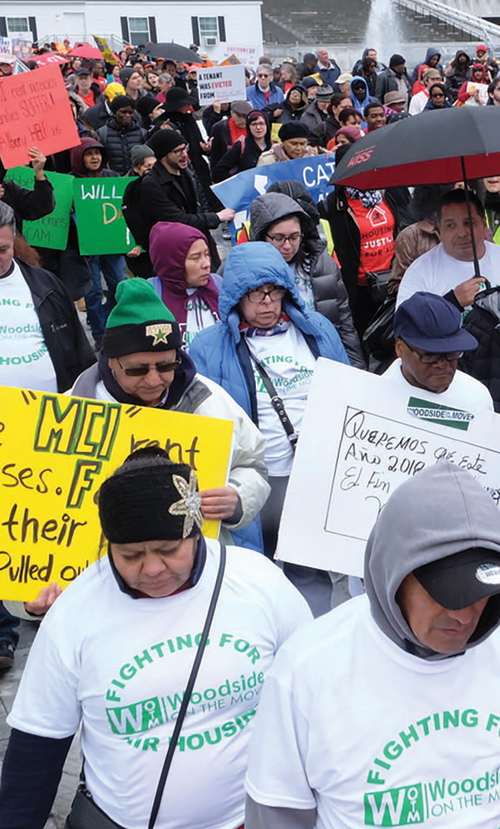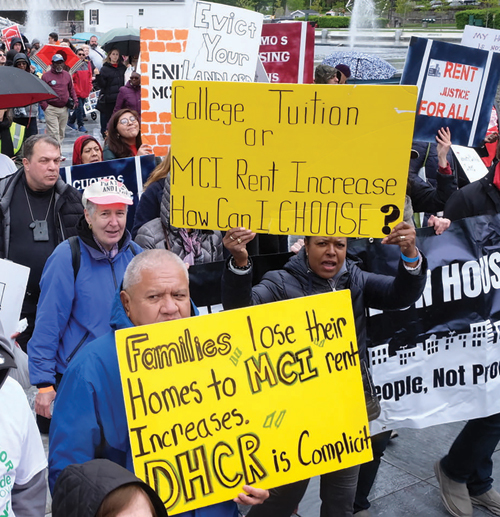MEMBERS FIGHT FOR HOUSING JUSTICE
June 10, 2019

Yet across all 1199's regions, members are facing increasingly tight housing markets in which wages lag behind rent and other housing costs.
That’s why members joined thousands of housing justice activists from across New York State at a rally in Albany on May 14 to urge lawmakers to reconsider the regulations for renters. With the NYS legislature in Democratic control and laws governing rent stabilization set to expire on June 14, activists believe it is the best chance they’ve had in years to enact tenant friendly reforms.
The need for change is urgent, says Maureen Spillane, who works in environmental services at Albany Medical Center. She recently testified to that fact before the New York State legislature.
“Even though I have done this job for 30 years, I cannot afford to pay the rent. My pay doesn’t go up, but rents get more expensive.
“Every month, I wonder if I’m going to have enough money to pay the rent. I also have to buy food for my son and grandson. I don’t want to choose between food and paying the rent. That’s not fair,” she says.”
Housing costs aren’t just a problem in large cities. Angela Marie is an 1199 Nursing Home worker from the Glen Falls area of Upstate New York. She is struggling to find affordable housing for herself and her children.
“Why can’t I find a place big enough for us all? At this point we are all just miserable. I got money for the first month’s rent and security deposit, I’m gainfully employed. But I can’t afford $1,500 a month, which is what 3-4 bedrooms cost around here. This is insanity,” she says.
Givanni Blackwell, medical assistant at Boston Medical Center, is facing similar challenges in the Bay State’s exploding housing market. Blackwell is the single parent of three young children. Even though she’s eligible for affordable housing, the subsidies hardly go far enough as Boston-area rents skyrocket. After paying her rent she has barely anything left.
“With the cost of living always on the rise I have a hard time paying rent, buying groceries and the bare necessities for my family. I’m left scraping up pennies and dimes.
“The chances of saving a deposit to buy a home are slim to impossible. Gentrification is at an all-time high in communities where the residents are under the poverty level because there isn’t any cap on rent and no rent control in our communities,” she says.

Housing has long been a tinderbox in New York, affirms Nina Howes, an RN and former 1199 delegate at Mount Sinai Beth Israel. Howes was forced out of two apartments in succession on the Lower East Side and then another in Gramercy Park, near the hospital, as the rents shot up beyond what she could afford.
Currently, it’s estimated that roughly three million people across New York State are renters, and almost half of them are considered rent-burdened, which means they are paying more than 30 per cent of their wages in rent. The crisis has led activists to call for a package of reforms known as universal rent control across the entire state. One of the biggest loopholes that advocates seek to close is a rule that allows landlords of rent stabilized apartments to impose significant rent hikes after making renovations. Tenant advocates say landlords abuse the provision so they can raise rents. Other landlords, notably the Trump Organization, have been accused of making unnecessary repairs to push up prices in rent stabilized housing.
New York reformers want to see rent stabilization rules extended. Tenants and housing rights activists are pressing the fight on several fronts: at the state level, in city halls, and in community board meetings, where developers have to appear before their projects are approved.
Antoinette Rose, a medical records analyst at Montefiore Medical Center, lives in the Bronx, N.Y. She attends local community board meetings to scrutinize development plans and encourages folks to get involved in the process, no matter where they live.
“If the local community doesn’t get involved,” she said, “Before you know it, the mom-and-pop stores that have been there for years will be forced out and the only people who will be able to afford to live in decent buildings with gardens will be the rich.”
- 1199 Magazine: May / June 2019

